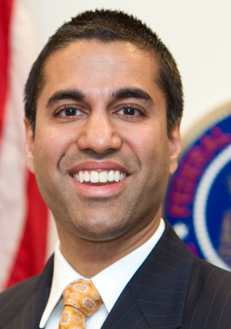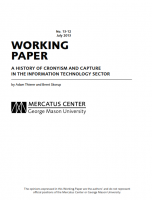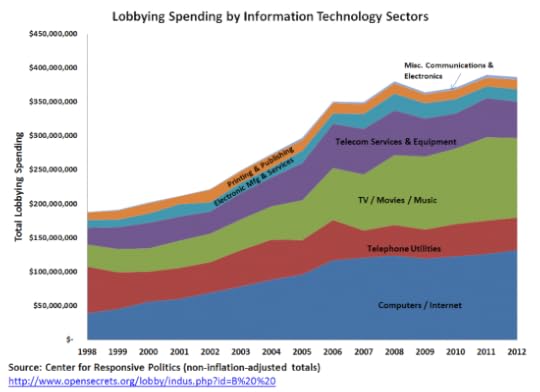Adam Thierer's Blog, page 61
July 16, 2013
K. Eric Drexler on the future of nanotechnology
K. Eric Drexler of Oxford University discusses his latest book Radical Abundance: How a Revolution in Nanotechnology Will Change Civilization. Drexler, who has been referred to as “the founding father of nanotechnology” covers how society can conserve resources and make more efficient products through nanotechnology; how nanotechnology can solve some of the world’s most pressing problems; how this varies from what you’ve seen in science fiction; and, how we can improve manufacturing at the molecular level.
Related Links
Radical Abundance: How a Revolution in Nanotechnology Will Change Civilization, Drexler
Engines of Creation: The Coming Era of Nanotechnology, Drexler
Progress Toward Advanced Technology, Drexler
Bio: K. Eric Drexler, Drexler







July 15, 2013
The NSA is screwing us on Internet governance
The New York Times reports:
The Russians, who with only minimal success, had for years sought to make these companies provide law enforcement access to data within Russia, reacted angrily. Mr. Gattarov formed an ad hoc committee in response to Mr. Snowden’s leaks.
Ostensibly with the goal of safeguarding Russian citizens’ private lives and letters from spying, the committee revived a long-simmering Russian initiative to transfer control of Internet technical standards and domain name assignments from two nongovernmental groups that control them today to an arm of the United Nations, the International Telecommunications [sic] Union.
It’s not immediately clear to me how moving Internet standards and DNS from IETF and ICANN to the ITU is supposed to stop the NSA from spying on Russians, so the smart read is that this is retaliation pure and simple.
Brazil’s foreign minister, Antonio Patriota, for example, a week ago endorsed the Russian proposal to transfer some control over Internet technical standards to the United Nations telecommunications agency.
While these are not major changes in policy positions, the NSA’s surveillance programs seem to be galvanizing those who want the ITU to take an active role in Internet governance. It’s time for the USA to practice what it preaches on Internet freedom.







DoD Asks the FCC to Enhance Its Contractual Leverage Through Regulatory Fiat
“In today’s globally competitive era, the United States cannot continue to delay its transition to Internet-enabled infrastructure.”
Last week the Department of Defense (DoD) filed comments with the FCC in its proceeding examining the transition from outdated telephone technologies to Internet Protocol (the “IP-transition”). The comments, which were filed “on behalf of the consumer interests” of the DoD by a civilian attorney in the Army’s Regulatory Law Office (emphasis added), ask the FCC to “consider potential adverse consequences on public safety and national security” of requiring federal agencies to “prematurely transition to different technologies.”
What are these potential adverse consequences? The italicized “interests” of the DoD provide the answer: It wants to avoid incurring any costs to upgrade its outdated telephone technologies to modern, Internet Protocol technologies when its current communications contracts expire in 2017.
While that may be a legitimate concern for DoD procurement plans, federal budgetary pressures are not a legitimate regulatory concern. The FCC cannot require private companies to maintain outdated technologies in order to reduce DoD budgetary pressure or give it additional leverage in its future contract negotiations. The appropriate forum for addressing federal budgetary concerns is Congress, not the FCC.
The DoD filing nevertheless asks the FCC to consider the impact of the IP-transition on federal contracts with private companies for communications services that use legacy telephone technologies. Most of these contracts are administered by the Government Services Administration through its “Networx” contracting program, which is “set to expire” in 2017. The replacement program, which is considering the use of “standardized IP” infrastructure, is entitled “Network Services 2020”. The obvious implication of this date is that the federal government is considering extending the “Networx” program beyond its set expiration and is concerned that the IP-transition could hinder its negotiations.
Though the federal government is free to seek an extension of its Networx contract until 2020, it cannot use federal regulation to increase its negotiating leverage. The FCC has a “longstanding policy” of declining to adjudicate private contractual issues – a policy that is particularly appropriate when the federal government is a party to the contract. It would not serve the public interest to deny consumers additional access to modern technologies merely to give the federal government additional leverage in its contract negotiations.
That does not mean the FCC should ignore public safety and national security. It should honor the DoD request to participate in the trial selection process and coordinate with it and other government agencies throughout the IP-transition to avoid disruption to critical communications.
It should also recognize, however, that the other concerns raised by the DoD are primarily commercial in nature. The DoD filing carefully avoids saying that the legacy telephone network is technologically necessary to meet its operational demands. It instead “embraces advances in telecommunications technologies and services” and “applauds” efforts to pursue “more efficient, reliable and functionally robust” networks – so long as the DoD isn’t required to “prematurely” (i.e., prior to 2020) expend any funding on such networks.
These budgetary concerns are misplaced. The capabilities offered by the all-IP networks of the future will ultimately enhance public safety and national security, while improving education and healthcare, and significantly contributing to our Nation’s economy. In today’s globally competitive era, the United States cannot continue to delay its transition to Internet-enabled infrastructure. The longer we wait to begin our transition, the more likely it is that another nation’s flag will greet us when we finally reach its end.







July 12, 2013
My Two Favorite Technology Policy Books of the Past Half-Century

 I was honored to be asked by the editors at Reason magazine to be a part of their “Revolutionary Reading” roundup of “The 9 Most Transformative Books of the Last 45 Years.” Reason is celebrating its 45th anniversary and running a wide variety of essays looking back at how liberty has fared over the past half-century. The magazine notes that “Statism has hardly gone away, but the movement to roll it back is stronger than ever.” For this particular feature, Reason’s editors “asked seven libertarians to recommend some of the books in different fields that made [the anti-statist] cultural and intellectual revolution possible.”
I was honored to be asked by the editors at Reason magazine to be a part of their “Revolutionary Reading” roundup of “The 9 Most Transformative Books of the Last 45 Years.” Reason is celebrating its 45th anniversary and running a wide variety of essays looking back at how liberty has fared over the past half-century. The magazine notes that “Statism has hardly gone away, but the movement to roll it back is stronger than ever.” For this particular feature, Reason’s editors “asked seven libertarians to recommend some of the books in different fields that made [the anti-statist] cultural and intellectual revolution possible.”
When Jesse Walker of Reason first contacted me about contributing my thoughts about which technology policy books made the biggest difference, I told him I knew exactly what my choices would be: Ithiel de Sola Pool’s Technologies of Freedom (1983) and Virginia Postrel’s The Future and Its Enemies (1998). Faithful readers of this blog know all too well how much I love these two books and how I am constantly reminding people of their intellectual importance all these years later. (See, for example, this and this.) All my thinking and writing about tech policy over the past two decades has been shaped by the bold vision and recommendations set forth by Pool and Postrel in these beautiful books.
As I note in my Reason write-up of the books:
The past 45 years have seen remarkable advances in information technology: the Internet, mobile communications, ubiquitous news and entertainment options, and much more. What made these and other innovations possible was a general openness to the unplanned, the unpredictable, and even the uncontrollable. In our willingness to embrace a world of uncertainty and incessant change, we found unparalleled technological abundance. No two books more eloquently captured and celebrated the information age than Ithiel de Sola Pool’s Technologies of Freedom and Virginia Postrel’s The Future and Its Enemies.
And I conclude by noting that “While plenty of tech pundits and academics cling to… stasist thinking today, Pool and Postrel’s books continue to provide beacons for a better world, free from the top-down, technocratic mentality and prescriptions of the past. At least thus far, permissionless innovation has largely trumped the precautionary principle in tech policy. Let’s hope the dynamist vision can hold the line for another 45 years.”
Head over to Reason to read the rest of my essay as well as all the other excellent books that contributors have recommended as part of the symposium. There are some really great selections in there.
And if you care about the future of technological freedom and human liberty and progress more generally, please do read (or re-read) both Pool and Postrel’s books when you have a chance. They changed my life and they will change yours, too.







July 11, 2013
FCC Commish Ajit Pai on Protectionism & Cronyism in the Tech Sector
 Ajit Pai, a Republican commissioner at the Federal Communications Commission (FCC), had an outstanding op-ed in the L.A. Times yesterday about state and local efforts to regulate private taxi or ride-sharing services such as Uber, Lyft, and Sidecar. “Ever since Uber came to California,” Pai notes, “regulators have seemed determined to send Uber and companies like it on a one-way ride out of the Golden State.” Regulators have thrown numerous impediments in their way in California as well as in other states and localities (including here in Washington, D.C.). Pai continues on to discuss how, sadly, “tech start-ups in other industries face similar burdens”:
Ajit Pai, a Republican commissioner at the Federal Communications Commission (FCC), had an outstanding op-ed in the L.A. Times yesterday about state and local efforts to regulate private taxi or ride-sharing services such as Uber, Lyft, and Sidecar. “Ever since Uber came to California,” Pai notes, “regulators have seemed determined to send Uber and companies like it on a one-way ride out of the Golden State.” Regulators have thrown numerous impediments in their way in California as well as in other states and localities (including here in Washington, D.C.). Pai continues on to discuss how, sadly, “tech start-ups in other industries face similar burdens”:
For example, Square has created a credit card reader for mobile devices. Small businesses love Square because it reduces costs and is convenient for customers. But some states want a piece of the action. Illinois, for example, has ordered Square to stop doing business in the Land of Lincoln until it gets a money transmitter license, even though the money flows through existing payment networks when Square processes credit cards. If Square had to get licenses in the 47 states with such laws, it could cost nearly half a million dollars, an extraordinary expense for a fledgling company.
He also notes that “Obstacles to entrepreneurship aren’t limited to the tech world”:
Across the country, restaurant associations have tried to kick food trucks off the streets. Auto dealers have used franchise laws to prevent car company Tesla from cutting out the middleman and selling directly to customers. Professional boards, too, often fiercely defend the status quo, impeding telemedicine by requiring state-by-state licensing or in-person consultations and even restricting who can sell tooth-whitening services.
What’s going on here? It’s an old and lamentable tale of incumbent protectionism and outright cronyism, Pai notes:
These are just the latest chapters in an old economic story. Incumbents have long promoted regulation in the name of protecting consumers when their actual goal is to block new entrants and stifle competition. As Milton Friedman observed, “The pressure on the legislature to license an occupation rarely comes from the members of the public … the pressure invariably comes from members of the occupation itself.”
Indeed, this is exactly the sort of cronyist nightmare that Brent Skorup and I documented in our new Mercatus Center report, “A History of Cronyism and Capture in the Information Technology Sector.” Our 73-page working paper outlines the evolution of government-granted privileges in America’s information and communications technology marketplace and in the media-producing sectors. Sadly, there are all too many examples of special interests seeking to commandeer the levers of government power to distort market outcomes and head off disruptive forms of innovation or new competition.
“Consumer protection is important,” Pai notes, “and rules to ensure safety and to deter fraud are necessary. But many regulations aren’t about safeguarding consumers; they’re about entrenching incumbents (at consumers’ expense), and they’re typically created by the very agencies that are supposed to oversee those incumbents.” he correctly observes.
The costs of cronyism can be significant. In our paper, Skorup and I note that when companies seek and receive favors from government, it can dull entrepreneurialism and competition in this highly innovative sector since time and resources spent on influencing politicians and capturing regulators cannot be spent competing and innovating in the marketplace. Every dollar spent trying to influence government is a dollar that could have been better spent trying to develop the next iPhone or other innovative gadget or service. Thus, cronyism can negatively impact consumer welfare by denying consumers more and better products and services. Additionally, consumers might end up paying higher prices or higher taxes due to government privileges for industry.
Worse yet, cronyism also raises the specter of greater government control of the Internet and of the digital economy. When policymakers dispense favors, they usually expect something in return. Just ask the agriculture and transportation sectors how their experience with favor-seeking has worked out. Yes, they have often received the special favors and benefits they sought, but along with the goodies came a litany of demands from lawmakers and regulators about how to run their businesses.
At the end of the day, it all goes back to the consumer and how they get screwed in this process. As Pai eloquently puts it:
Heavy-handed regulations hurt the very consumers they’re supposed to help. Consumers fare best when the barriers to business entry are low, which helps ensure that the market — any market — becomes competitive and stays that way. … Governments at all levels should guard against this tendency by prioritizing innovation and removing unnecessary regulations that burden risk-taking entrepreneurs.
Amen, brother! If only all government officials thought this way. I hope some of them at least take the time to read Commissioner Pai’s excellent essay.







July 9, 2013
Adam Thierer on cronyism
Adam Thierer, Senior Research Fellow at the Mercatus Center discusses his recent working paper with coauthor Brent Skorup, A History of Cronyism and Capture in the Information Technology Sector. Thierer takes a look at how cronyism has manifested itself in technology and media markets — whether it be in the form of regulatory favoritism or tax privileges. Which tech companies are the worst offenders? What are the consequences for consumers? And, how does cronyism affect entrepreneurship over the long term?
Related Links
A History of Cronyism and Capture in the Information Technology Sector, Thierer
Video: A History of Cronysim and Capture in the Information Technology Sector, Thierer
Adam Thierer Biography, Mercatus Center
Adam Thierer on Anti-Tech Grump Evgeny Morozov, Thierer







July 8, 2013
What Are We Going to Do after COPPA Fails?
This afternoon, Berin Szoka asked me to participate in a TechFreedom conference on “COPPA: Past, Present & Future of Children’s Privacy & Media.” [CSPAN video is here.] It was a in-depth, 3-hour, 2-panel discussion of the Federal Trade Commission’s recent revisions to the rules issued under the 1998 Children’s Online Privacy Protection Act (COPPA).
While most of the other panelists were focused on the devilish details about how COPPA works in practice (or at least should work in practice), I decided to ask a more provocative question to really shake up the discussion: What are we going to do when COPPA fails?
My notes for the event follow down below. I didn’t have time to put them into a smooth narrative, so please pardon the bullet points.
COPPA will fail in the long-run for two reasons:
(1) With COPPA, the FTC is engaged in a technological arms race that it cannot win.
COPPA was formulated for a Web 1.0 world of static websites with limited interactivity. In that environment is worked reasonably well, although it certainly imposed costs on site developers and affected market structure.
As we moved into a Web 2.0 world of interactive social media in the mid to late-2000s, however, the rule has been strained by marketplace new realities. COPPA’s drafters never really envisioned sites like Facebook, Twitter, etc.
In our current environment—let’s call it the Web 2.5 world—we have added mobile geolocation and social discovery to the mix and that is straining COPPA to the breaking point.
But we are about to enter the Web 3.0 world of the “Internet of Things;” a sensor-based world in which the communication technology will literally be woven into the clothes we wear and all the devices we use.
Cisco has estimated that by 2020, 37 billion devices will be linked together and communicating.
It will be almost impossible for COPPA to keep up with the explosion of these technologies because everything in our lives and our children’s lives will be interconnected, communicating, and collecting data.
Information will be ubiquitously collected simply by nature of the technology itself.
The entire Web 3.0 world will be one of comprehensive passive information collection.
So, notions like “collection”, “directed at children” and “personal information” will be become impossible to enforce absence a flat-out ban on the technologies themselves
(2) COPPA will also fail because of the simple reality that the more complicated and costly this regulatory regime becomes, the more likely it is that that both kids and parents will ignore it or seek to actively evade it.
The actual monetary cost of any online service may obviously be one thing parents and kids seek to avoid.
But the bigger cost is the mental hassle associated with delayed gratification.
When people demand certain services, they want them now. And they will get them even when law gets in the way. And sometimes they value the utility / functionality that those services provide more than they value privacy.
A 2011 Harvard-Berkeley study pointed out the evasion is already rampant and that many parents are facilitating that result by encouraging their kids to lie about their ages online.
This problem will only increase in the Internet of Things era as kids and parents come to expect all their devices to be communicating at all times and retaining data for them.
So, what are we going to do about? How do we prepare for the post-COPPA world that’s coming?
We shouldn’t just throw up our hands in defeat.
But we must accept the technological and practical challenges associated with regulation and seek out alternative approaches.
Best solution, therefore, is: Education, media literacy, and digital citizenship
We need to do a much better job educating both kids and adults about sensible online interactions.
We need to talk to our kids and each other about being more savvy, sensible, respectful, and resilient media consumers and digital citizens.
In encouraging our kids and fellow Netizens to be good “digital citizens,” we must stress smarter online hygiene (sensible personal data use) and better “Netiquette” (proper behavior toward others), which can further both online safety and digital privacy goals.
More generally, as part of these digital literacy and citizenship efforts, we must do more to explain the potential perils of over-sharing information about ourselves and others while simultaneously encouraging consumers to delete unnecessary online information occasionally and cover their digital footprints in other ways.
These education and literacy efforts are also important because they help us adapt to new technological changes by employing a variety of coping mechanisms or new social norms. These efforts and lessons should start at a young age and continue on well into adulthood through other means, such as awareness campaigns and public service announcements.
Additional Reading:
The Unintended Consequences of Well-Intentioned Privacy Regulation
Thoughts on Latest FTC COPPA Rule Revisions & Online Child Safety / Privacy
Joint CDT-PFF-EFF Comments on FTC’s COPPA Review & the Dangers of COPPA Expansion
What We Didn’t Hear at Yesterday’s FTC COPPA Workshop
COPPA 2.0: The New Battle over Privacy, Age Verification, Online Safety & Free Speech, by Berin Szoka & Adam Thierer







July 2, 2013
New Paper on “A History of Cronyism & Capture in the Information Technology Sector”
 The Mercatus Center at George Mason University has just released a new paper by Brent Skorup and me entitled, “A History of Cronyism and Capture in the Information Technology Sector.” In this 73-page working paper, which we hope to place in a law review or political science journal shortly, we document the evolution of government-granted privileges, or “cronyism,” in the information and communications technology marketplace and in the media-producing sectors. Specifically, we offer detailed histories of rent-seeking and regulatory capture in: the early history of the telephony and spectrum licensing in the United States; local cable TV franchising; the universal service system; the digital TV transition in the 1990s; and modern video marketplace regulation (i.e., must-carry and retransmission consent rules, among others.
The Mercatus Center at George Mason University has just released a new paper by Brent Skorup and me entitled, “A History of Cronyism and Capture in the Information Technology Sector.” In this 73-page working paper, which we hope to place in a law review or political science journal shortly, we document the evolution of government-granted privileges, or “cronyism,” in the information and communications technology marketplace and in the media-producing sectors. Specifically, we offer detailed histories of rent-seeking and regulatory capture in: the early history of the telephony and spectrum licensing in the United States; local cable TV franchising; the universal service system; the digital TV transition in the 1990s; and modern video marketplace regulation (i.e., must-carry and retransmission consent rules, among others.
Our paper also shows how cronyism is slowly creeping into new high-technology sectors.We document how Internet companies and other high-tech giants are among the fastest-growing lobbying shops in Washington these days. According to the Center for Responsive Politics, lobbying spending by information technology sectors has almost doubled since the turn of the century, from roughly $200 million in 2000 to $390 million in 2012. The computing and Internet sector has been responsible for most of that growth in recent years. Worse yet, we document how many of these high-tech firms are increasingly seeking and receiving government favors, mostly in the form of targeted tax breaks or incentives.
We argue that the creeping cronyism could have two major negative ramifications. First, it could dull entrepreneurialism and competition in this highly innovative sector since time and resources spent on influencing politicians and capturing regulators cannot be spent competing and innovating in the marketplace. Cronyism will also negatively impact consumer welfare by denying consumers more and better products and services. Additionally, consumers might end up paying higher prices or higher taxes due to government privileges for industry.
Second, cronyism also raises the specter of greater government control of the Internet and of the digital economy. When policymakers dispense favors, they usually expect something in return. They also become accustomed to having greater informal powers over the sector receiving favors, and contribute to DC’s infamous “revolving door” problem.
High-tech America’s recent embrace of Washington could take it down the familiar path followed by the agriculture, telecommunications, and automotive sectors (among many others), with government becoming both protector and punisher of industry. Today’s dynamic tech industries will increasingly come under the “Mother, may I?” permission-based regulatory regime that encumbered the older information technology sectors.
Finally, this paper offers strategies for stalling and diminishing the cronyism already taking root in the high-tech sector. We suggest several targeted reforms to limit or undo cronyism. Generally speaking, however, we note that, as economist David R. Henderson argued in an earlier Mercatus Center report, “There is only one way to end, or at least to reduce, the amount of cronyism, and that is to reduce government power.”
The paper can be downloaded from the Mercatus website, SSRN, or Scribd. The Scribd version is embedded down below. (Also, here’s some coverage of the paper over at the Washington Post’s “Wonkblog” from our old colleague Tim Lee as well as from Bloomberg Businessweek. And here’s a U.S. News oped that Brent and I wrote condensing our paper into just 600 words.)
A History of Cronyism and Capture in the Information Technology Sector [Thierer and Skorup - July 2013] by Adam Thierer







Patrick Ruffini on the defeat of SOPA
Patrick Ruffini, political strategist, author, and President of Engage, a digital agency in Washington, DC, discusses his latest book with coauthors David Segal and David Moon: Hacking Politics: How Geeks, Progressives, the Tea Party, Gamers, Anarchists, and Suits Teamed Up to Defeat SOPA and Save the Internet. Ruffini covers the history behind SOPA, its implications for Internet freedom, the “Internet blackout” in January of 2012, and how the threat of SOPA united activists, technology companies, and the broader Internet community.
Related Links
Patrick Ruffini, Engage
Patrick Ruffini, Huffington Post
Hacking Politics: How Geeks, Progressives, the Tea Party, Gamers, Anarchists and Suits Teamed Up to Defeat SOPA and Save the Internet, Goodreads







July 1, 2013
Senator Rubio Is Right On Immigration
Senator Marco Rubio is right on immigration. In his remarks regarding the immigration bill passed by the Senate last week, Rubio noted that immigration is an American story.
For over two hundred years now, they have come. . . . From Ireland and Poland, from Germany and France. From Mexico and Cuba, they have come. They have come because in the land of their birth, their dreams were bigger than their opportunities.
As Jack Kemp so famously said, “We are a nation of immigrants.” From the Native Americans who crossed the land bridge over what is now the Bering Strait to the apex of European immigration in the early 20th Century (when 13.5 million immigrants were living in the United States), America has always been the land of opportunity.
“We are still the hope of the world” today, and we still need immigrants. We are not producing enough skilled workers to support our high-tech economy and our population is aging. If immigrants had the opportunity, they could fill our high-tech vacancies, expand our workforce, and grow our economy. Without them, we will export more jobs overseas and watch our economy continue to struggle.
We should of course take prudent measures to improve border security and curb illegal entry into the United States. But we should also recognize that fences will not stop those who earnestly seek the American dream any more than the Great Wall of China stopped the Qing (the people who conquered those who built the Great Wall). The best antidote to illegal immigration is a sensible system that provides immigrants with an opportunity to enter and remain in the country legally.
Ideas, not walls, have always been America’s greatest strength. The American dream is our greatest idea and immigration is its legacy. Throughout our history immigrants have energized economic growth and innovation in this country by pursuing freely their dreams for a more prosperous future. We share the same dream, and when we dream it together, America is at its very best.







Adam Thierer's Blog
- Adam Thierer's profile
- 1 follower







